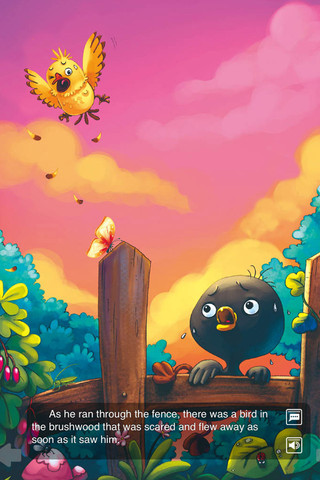There just aren’t a lot of bilingual English-Chinese books that an American parent can easily get a hold of. We’ve mined out most of what’s available on Amazon and have about 5-6 books to show for it. Thankfully, digital books don’t cost a thing to print and ship, and you can now find a decent number of bilingual apps for iPad from publishers on both sides of the Pacific.
If, like me, you have some skill with understanding and speaking Chinese, searching the App Store for “pinyin” can get you pretty far. Doing this, I discovered the ill-named “Blighty Studio,” a self-described “elite team of Ninja Warriors” who convert children’s books from China Education Publishing House Group into iPad apps. They have dozens of apps, most educational, and I gambled $0.99 to try out “The Ugly Duckling.”“The Ugly Duckling” is, overall, a decent buy for $0.99. For bilingual households, its best feature is the ability to have the story read aloud in one language while displaying text in another. It takes a little fiddling, but you can set the story up to be read in Chinese and follow along in Chinese traditional, Chinese simplified, Chinese traditional + pinyin, Chinese simplified + pinyin, or English. This is great for someone like me who has limited Chinese vocabulary – I can get the gist of what’s going on in English, then switch to pinyin to make sure I’m pronouncing words right.
The English translation is competent, if stiff and somewhat literal. These are all good qualities if you are trying to learn Chinese – it’s easier to map new vocabulary words this way. The story itself, however, hews far too closely to the Hans Christian Anderson original, which is to say it’s a bit long and out of tune with modern American culture. The writing doesn’t help either, sounding a little like it got wrung through Google translate from English to Chinese and then back to English again:
“He dove into the water one moment and came out the next. It is only through this way could he enjoy a little bit fun of life.”
(Yes, “The Ugly Duckling” is a pretty ugly story, featuring quite a lot of bullying and cruelty).
The two voice readers are quite different in tone – the Chinese reader is very high-pitched and cloying, while the English voice sounds like she’s laboring with effort (though I do think she sounds like a native English – by which I mean American – speaker).
The illustrations are decent enough, with some telling Chinese details (for example, in one image a chick taunts the ugly duckling by pulling down its lower eyelid). Every page has a few interactive elements that might move or speak if tapped (what they say can be quite random and irrelevant). Annoyingly, swiping does not turn pages; you have to click near-invisible arrows at the bottom-right and bottom-left to move forwards and back. Another serious annoyance is that the app shuts down if the screen blanks out, which seems to me a major bug. Finally, the app also offers some distracting “features” such as three games and five pages of random vocabulary words, neither of which have anything at all to do with the book.
You’re not going to get this app for its innovation, art style, voice acting, or writing. You’ll get it because it’s one of the very few children’s apps out there that let you read pinyin while listening to Chinese or English out loud. And that justifies the modest $0.99 download price.
More soon on other bilingual apps…


